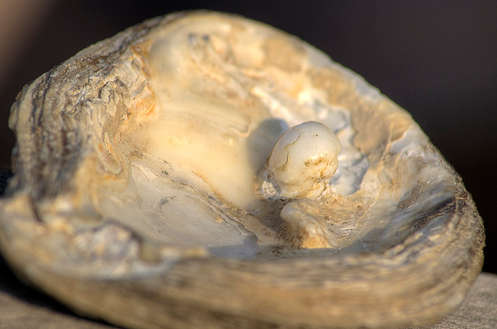FWP:
SETS == WORDPLAY
COMMERCE: {3,3}
MADNESS: {14,3}
Bekhud Dihlavi seems to be saying the lover's head is the oyster-shell, and that's both so apt (because the breaking open of the oyster-shell is what exposes the pearl) and so grotesque (because of the vision of the whole head suddenly split in half like an opened oyster) that it's a bit of a shock. But fortunately the verse says clearly that it's each stone and brick that is an oyster-shell. So probably Bekhud Dihlavi just phrased his commentary clumsily; but even if he's actually saying what he might seem to be saying, he's wrong.
But still, to make every one (as the verse carefully emphasizes) of the solid, unbreaking stones and bricks an 'oyster-shell' seems to be pushing the imagery pretty hard-- or at least, using it very selectively. It's true that an oyster-shell produces a pearl, and that's what the verse wants us to think of. But it's also true that the oyster-shell generates the pearl from within itself, and that the pearl is revealed only when the oyster-shell itself is broken open (and the oyster killed); and this is far from the situation of the stones and bricks.
So each stone and brick is an oyster-shell in the sense that it helps, in its indirect fashion, to provide the pearl of shikast -- a word that means both 'breaking', which is appropriate for the procurement of a pearl (and which is what might happen to the lover's head if boys throw stones and bricks at him; on this see {35,10}), and 'loss, damage', which anticipates the commercial imagery in the next line. For in fact this is a verse of thoroughgoing and complex wordplay. And at its heart, the imagery of madness (as in the Arabic word saudā ) is effectively fused to the imagery of commerce (as in the Persian word saudā ). (See the definitions above.) For another use of this ideally multivalent word-pair, see {58,5}.
When it comes to madness, we have the boys throwing stones and bricks at the madman, and the madman's pursuit not of a real pearl but of the crazy-sounding, or at least paradoxical, 'pearl of breaking/defeat'. Thus if someone acts 'from/with madness' in doing 'madness' (or 'commerce'), what's the harm? He has nothing to lose, and a remarkable pearl to gain.
When it comes to commerce, we have the claim that there's no 'loss' if one would do 'business' (or 'madness') even in a dubious state of sanity-- after all, one might end up with an apparently valuable 'pearl'.
Might 'Madness' even be a semi-personification, someone with whom one might do business? One might bargain 'with' him; one might buy a pearl 'from' him. If the se can be made to stretch that far, the commercial sense of the verse becomes even more enjoyable.
For another-- and powerful-- use of shikast
, see {71,1}; the Persian infinitive shikastan
itself appears in {37,5x}. And for another
convergence of 'loss' and 'madness', see Arshi's recommendation, {91,9}. Some other oyster-shell-and-pearl verses: {237x,5 and 7}; {242x,4}; {316x,1}; {344x,6}; {418x,2}.

Nazm:
In taking the saudā of madness upon one's head there's no loss, because each stone and brick that the boys throw at your head is an oyster-shell, the pearl of which is breaking/defeat. (243)
== Nazm page 243